Will Pierce stands on a platform near the top of a telephone pole and peers w-a-a-a-a-y down into a hoop of fire. A hoop of fire he’s about to leap into.
He’ll pass through the flames and into a swimming pool at Pierce Country Day Camp in Roslyn. A camp owner-director braving the dramatic jump in front of campers and parents is a tradition masterminded by Pierce’s great-grandfather Forrester “Pop” Pierce, who founded the summer camp in 1918.
“The trick is to go through fast, like when you put your finger through a candle,” says Pierce, 32. “It’s a little bit scary, but mostly thrilling.”
When Pierce leaps this July, he’ll mark the 100th summer of Pierce Country Day Camp, which has been owned by four generations of the Pierce family. Will now runs the operation along with his cousin Courtney, also 32, and three members of what they refer to as “Generation Three” — Doug, 64, Greg, 60, and Forrester III, 59. Pop Pierce and the members of Generation Two are long gone.
More than 900 campers ages 3 to 13 now attend Pierce each summer, and they have included children of the rich and famous, such as Donald Trump’s 5-year-old granddaughter Arabella, daughter of Ivanka, who attended during the summer of 2016. In fact, one day last summer, in the midst of campaign season, Trump himself got her off the camp bus on her trip home to Manhattan, Forrester Pierce says, which amazed the bus staff. “As soon as they pulled away from the front door of the building, the phone rang here,” Forrester says, with the staff reporting the happening. “They were very excited.”
For decades, all of the Pierce family members have lived in homes either on the camp property or around its perimeter. “My cousins and I grew up like siblings,” Pierce says. “We would get home from school and run amok on the camp grounds. We were all counselors together.” And Generation Five has now begun — Will has a daughter, Brooke, 2, and is expecting another child this summer “right in the middle of camp,” and Courtney has two sons, Johnny, 4, and Charlie, 2, and is due with a third child in February. “I wanted to give my children the kind of family environment and experience I had growing up,” Will Pierce says. “I’m hoping one of my children will fall in love with the business and want to take it over like I did.”
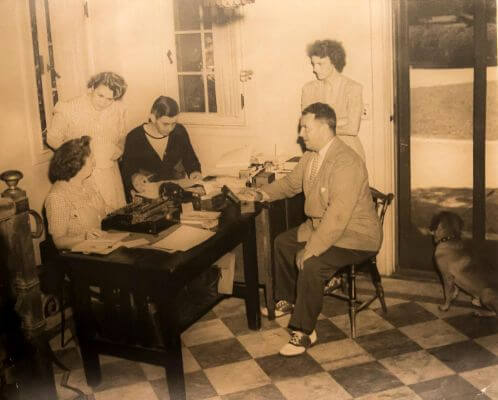
(Credit: Pierce Country Day Camp/Marisol Diaz)
Pierce is among the oldest day camps in the United States. “It’s rare for a camp to be in business for that long. Seventy-five years is an extraordinary amount of time,” says Susie Lupert, executive director of the American Camp Association, New York and New Jersey. The ACA is the accrediting body for U.S. summer camps. “It’s not just considered one of the oldest camps, but it’s also considered one of the best camps. They have been tireless leaders in the camp industry,” Lupert says. “They really are examples of people who are dedicated to youth development.”
Pictured: Helen Pierce, standing at left, with Forrester “Pop” Pierce seated at right, work with staff at Pierce Country Day Camp. The photo hangs in the hallway in the entryway of the mansion.
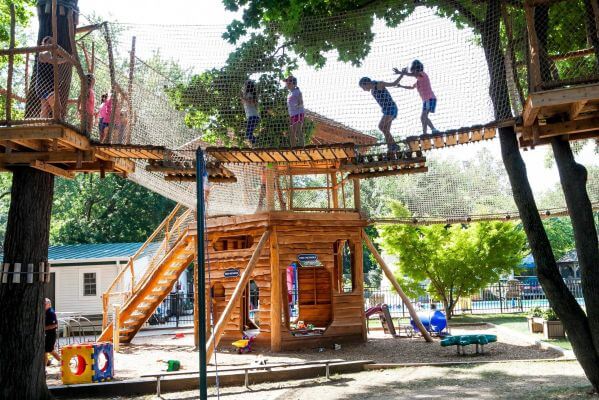
(Credit: Marisol Diaz)
Pop Pierce launched Pierce Country Day Camp in Deal, N.J., in 1918, moved the camp to rented property in Nassau County a few years later and then purchased an estate in Roslyn where he gave the camp its permanent home the 1930s. Pierce has grown to be among the biggest and most expensive camps on Long Island — eight weeks of swimming in the camp’s seven swimming pools, playing sports, making arts and crafts, shooting arrows at archery and more costs $8,950. Forrester Pierce says that’s so the camp can maintain state-of-the-art facilities — in 2016, for instance, the camp added an enormous treehouse called Treemendous and an outdoor “musical playground” dubbed Musical Rhapsody that includes a piano, xylophone and more. “That was just one year of capital improvements,” Will Pierce says.

(Credit: Marisol Diaz)
Ron Katz, 64, of Woodbury, was a camper at Pierce in the early 1960s. He sent his daughter Kim London, 39, of Port Washington, to Pierce and she was also a counselor there. “There’s every single activity you could ever wish to participate in,” London says of the camp. “I was the kind of kid who was a jack-of-all-trades, master of none. For me, having a variety of activities throughout the summer was perfect for my personality.” London now sends her daughter Brooke, 5, to Pierce.
Pictured: Madison Rosen of Manhasset 4, Brooke Lubin 4, of Roslyn of Chloe Schmidt 4, of Roslyn play the piano at Musical Rhapsody Garden at the camp.

(Credit: Pierce Country Day Camp)
During the winter, Pierce runs a preschool on the grounds. It runs its own bus transportation company. The family also owns a sleepaway camp called Pierce Camp Birchmont in New Hampshire that’s now part of Will’s father Greg’s responsibilities and just celebrated its 65th summer. “A lot of people say, ‘What do you do for the other 10 months of the year?’ ” Will Pierce says. They do hiring, capital improvements, logistics and more.

(Credit: Pierce Country Day Camp)
A Native American theme is part of the Pierce tradition — camp photos through the years show the Pierce men in feathered headdresses and Courtney Pierce in braids and Native American dress at traditional camp “Pow Wows.” “It’s part of our brand, the Pow Wows, the Native American motif, the ‘Hoop of Fire,’ ” says Doug Pierce of Generation Three.
Some summers over the decades stand out to the Pierces for a variety of reasons. During the summer of 1943, for instance, Yankee baseball legend Babe Ruth visited camp. During the summer of 1992, the camp buried a time capsule in honor of its 75th anniversary, which they will dig up this July. During the summer of 2014, the five current owner-directors participated in the Ice Bucket Challenge in front of the entire camp. “That was a fun moment because the camp loved it,” Forrester Pierce says. “Good old wholesome fun.”
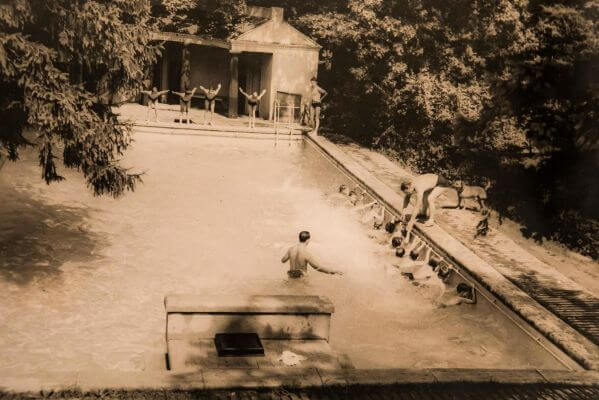
(Credit: Pierce Country Day Camp)

(Credit: Pierce Country Day Camp)
Pierce tries to keep a balance between maintaining the spirit of camp days of yore and meeting the demands of a providing a modern camp, Forrester says. The day camp still has the giant robot slide (pictured), for instance — “When we have parents come back with their kids they say, ‘Gigantor is still here!’ ” Courtney Pierce says — but has eliminated a former program in riflery — “That wouldn’t go over with the parents these days,” Courtney says.
These days, parental involvement is much greater than it was decades ago, Forrester says. The camp has nearly tripled its office staff to handle calls from parents asking about transportation, suntan lotion, hydration and more, Forrester says. And for kids, the scheduling of activities is broader — the camp has added a STEM program and a theater program, for instance.

(Credit: Marisol Diaz)
Pictured: Laylah Kaypour, 4, of Port Washington walks the bridge on Treemendous in Pierce Country Day Camp in Roslyn, Aug. 19, 2016.
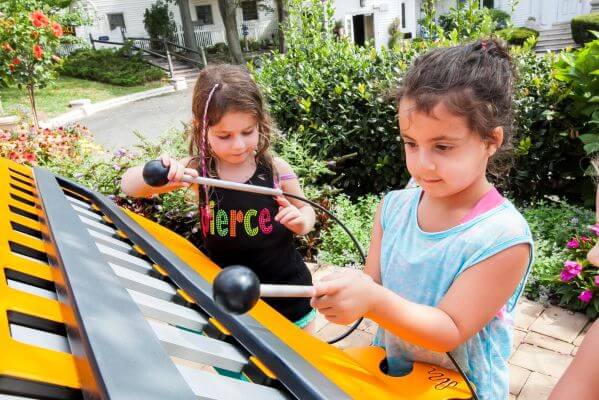
(Credit: Marisol Diaz)
Though Forrester Pierce says he spends much of the camp day in the office, he takes a lap around the camp grounds at least twice a day during the summer. “You hear the kids squealing and laughing,” Forrester says. “Nothing can bring a smile to your face more than listening to happy kids.”
Pictured: Sophie Weiss of Roslyn and Emma Forchheimer of Roslyn play xylophone at the camp’s Musical Rhapsody Garden.

(Credit: Marisol Diaz)
That’s made it worth the fact that for every single summer of his entire life he’s been working at the family’s camps, Forrester says. “I begged my father in college to have a summer off to drive cross-country. He said no. Once I retire, we will drive cross-country. I’ll be able to live that dream. It’ll be 45 years later, that’s all.”
Pictured: The camp’s Water World.
Four generations have been involved in running Pierce Country Day Camp, which has been in operation since it was founded by Forrester “Pop” Pierce in 1918.

























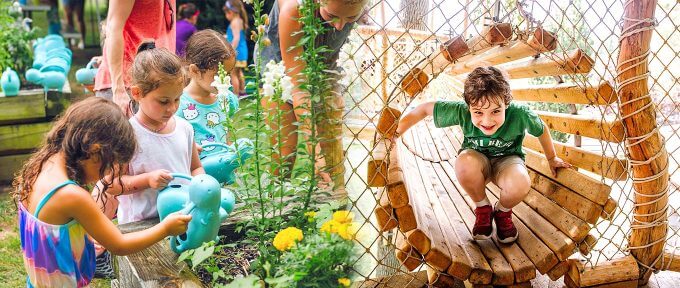
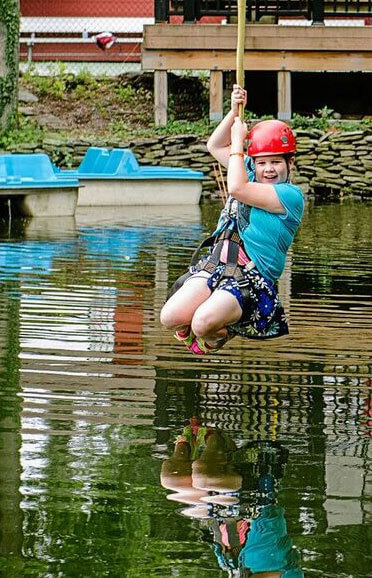
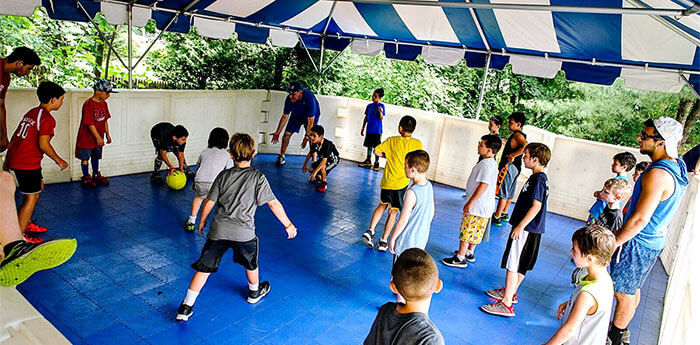


 Bungee – Enjoyed by all… Now scheduled weekly for 6’s!
Bungee – Enjoyed by all… Now scheduled weekly for 6’s!





